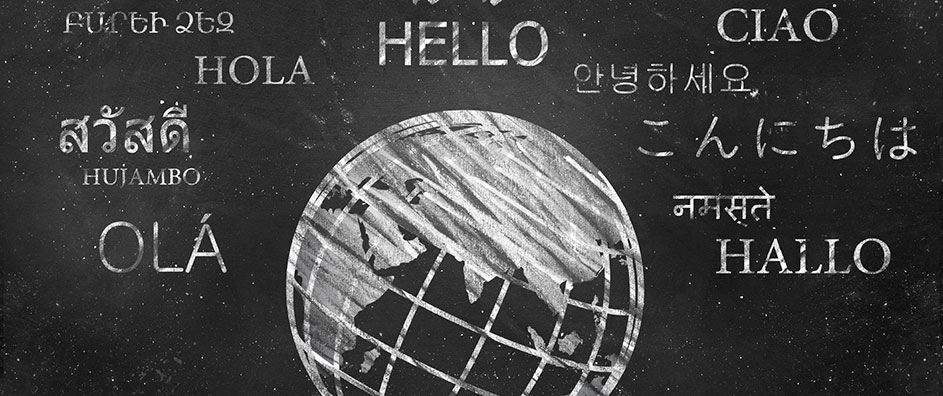The views expressed in our content reflect individual perspectives and do not represent the authoritative views of the Baha'i Faith.
This summer my wife and I finished our third and final year teaching English as a foreign language in China. One of our greatest joys has been playing a small part in the emergence of a common language that connects all the peoples of the world.
In early 2011, when my wife and I decided to get married that spring, we still didn’t know what country we would live in after our wedding. At the time, I worked at the Baha’i World Centre in Israel, and she was finishing her final year of university in the United States. It wasn’t possible for her to come to Israel and the American job market looked famously awful at the time. So we considered going somewhere else entirely.
China sounded good. We learned we could get work teaching spoken English in public schools in Shenzhen. Within a span of six months, we went from not being engaged and living on separate continents, to married and settling in at a Chinese secondary school with over 2000 students.
 In the three years my wife and I spent in Shenzhen, we had had countless interactions with students and local residents that in many ways illustrate an awareness of the growing interconnectedness of the global community. For some, speaking English enables their curiosity about foreign customs and lifestyles. For others, it becomes a source of frustration at a time when employers look more for brains than brawn from their job applicants. For many, though, learning English helps them discern and synthesize what they think works best in Chinese and western cultures.
In the three years my wife and I spent in Shenzhen, we had had countless interactions with students and local residents that in many ways illustrate an awareness of the growing interconnectedness of the global community. For some, speaking English enables their curiosity about foreign customs and lifestyles. For others, it becomes a source of frustration at a time when employers look more for brains than brawn from their job applicants. For many, though, learning English helps them discern and synthesize what they think works best in Chinese and western cultures.
Chinese students begin studying English at an early age. A demanding subject in school, English requires the students to internalize grammar, syntax, pronunciation, and vocabulary rules much more complex than those of their native tongue. When they become adults, though, these studies will help them professionally and personally in a world where traditional English-speaking countries have such an impact on international commerce, trade and interchange. But Chinese students aren’t the only ones straining every nerve to learn English. Beyond the countries of the Anglo Bloc, the English language now connects China to Southeast Asia, India, Africa, and Latin America.
When Baha’u’llah taught that the peoples of the world should settle upon one language and teach it to children in schools everywhere, he called for the convening of a special global gathering to consult about it and make an equitable decision. Even though no such meeting was ever held, English has taken the world by storm–and there seems to be no turning back. As the quality and scale of English instruction continues to rise in nations all around the world, we come closer to the era of a universal auxiliary language prophesied by Baha’u’llah over 125 years ago:
The day is approaching when all the peoples of the world will have adopted one universal language and one common script. When this is achieved, to whatsoever city a man may journey, it shall be as if he were entering his own home. These things are obligatory and absolutely essential. It is incumbent upon every man of insight and understanding to strive to translate that which hath been written into reality and action. – Baha’u’llah, Tablets of Baha’u’llah, p. 166.
In this passage, Baha’u’llah shows what the emergence of a global tongue could accomplish: wherever a person travels in the world, he or she will never feel like a foreigner. That world civilization, which Baha’is believe will one day emerge, will not just be a mere confederation of nations. It will be a single homeland. All of humanity will spontaneously feel the organic unity of its diverse peoples by speaking and hearing a common tongue.
With that said, I think our experience in China taught us something to bear in mind, especially if English does become the universal language. On the global stage, English now seems to represent in large part the language of the entertainment industry, international tourism, Western academic discourse, and Anglo Bloc multinational corporations–no doubt a symptom of the continued dominance of western countries in world affairs.
For example, in China I’ve all too often seen the Chinese word 国际 guójì, meaning “international,” used as a codeword for American or Australian. That tells me we do not yet have a level playing field, with some nations exerting a disproportionate influence on the emerging global culture. English has an organic, reflexive relationship to the Anglo Bloc countries—which means for most nations it is still a foreign tongue.
If English does become the universal world language, the peoples of the world will require some time to make it into a language of their own. Our planet truly needs a universal auxiliary language, and whether English or some other language fills the bill, eventually every human being will use it everywhere. When that day comes, no matter which language spreads around the entire globe, we will all feel at home with it.
You May Also Like
Comments

















I would not mind it as an auxiliary world language if its spelling was revised.
No more: double letters, sc, ei, ie, gh, irregular verbs and so on.